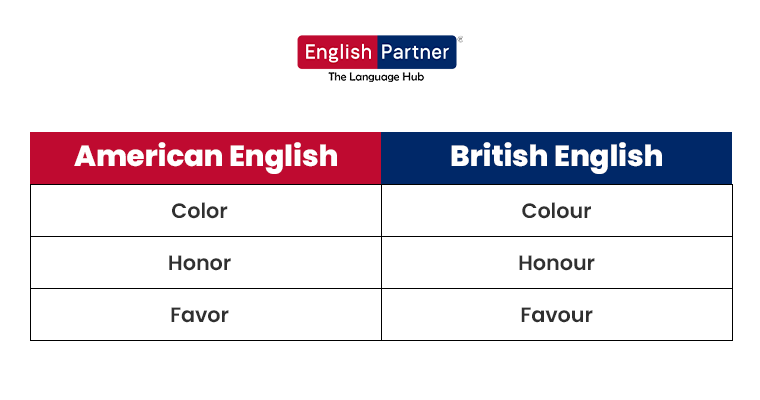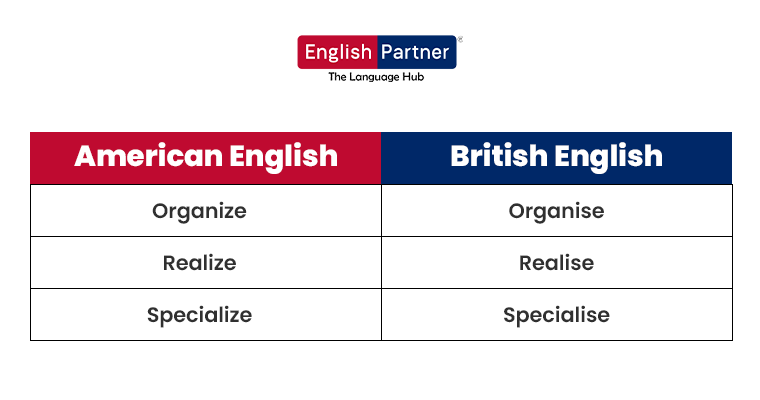For Big dreams, You don’t need big fees. Get 20% Off on all courses
| Grab 20% offer soon!
For Big dreams, You don’t need big fees. Get 20% Off on all courses
| Grab 20% offer soon!
Spelling is one area where the variances are most obvious. For example, if we Indians tend to use British spellings, people in the United Kingdom might choose a simpler variant. Consider the term “colour” as an illustration. It is spelled with a “u” in British English and just “color” in American English.
Did you know? Words like “organise” in British English become “organize” in American English! So, if you ever find yourself in a spelling bee, keep these in mind!
Among the first things you’ll notice is the usage of the letter “u.”
Words like,


Differences in Vocabulary between American and British English:
British and American English can occasionally feel like two separate languages when it comes to vocabulary! Words vary greatly, from commonplace objects to everyday expressions. Let’s examine a few of these entertaining lexical discrepancies that may cause humorous misinterpretations.

Pronunciation:
Another area where American and British English might seem like two sides of the same coin is pronunciation! Words can differ greatly in how we say them even when they have the same spelling. Let’s look into some of these pronunciation variances that can lead to fun—and sometimes confusing—conversations.
The “R” Factor:
The way the letter “R” is pronounced is another significant distinction. In words like “car” and “hard,” the “R” is pronounced clearly in American English. However, the “R” is frequently softer or even silent in many British accents, especially received Pronunciation, making it sound more like “cah” and “haad.” When dialects collide, this can lead to some amusing misunderstandings!
Vowel Sounds:
Vowel Sounds:
Vowel sounds vary considerably as well. For instance, the word “dance” is pronounced more like “dahnce” in British English than it is in American English, which has a flat “a” sound. Similarly, the word “bath” has a longer “a” sound in British English, but a short “a” sound in American English.
The Factor H:
Vowel sounds vary considerably as well. For instance, the word “dance” is pronounced more like “dahnce” in British English than it is in American English, which has a flat “a” sound. Similarly, the word “bath” has a longer “a” sound in British English, but a short “a” sound in American English.
The way in which collective nouns are handled is one of the most obvious distinctions. Collective nouns (such as “team,” “family,” or “government”) in British English can be singular or plural depending on the situation.
Example: British English: The team is/are winning. American English: The team is winning.
In American English, collective nouns are often interpreted as singular, which can lead to some misunderstanding in conversations.
The way in which collective nouns are handled is one of the most obvious distinctions. Collective nouns (such as “team,” “family,” or “government”) in British English can be singular or plural depending on the situation.
Example: British English: The team is/are winning. American English: The team is winning.
In American English, collective nouns are often interpreted as singular, which can lead to some misunderstanding in conversations.
There are differences in date formats as well. In American English, the format is usually month/day/year (E.g., October 4, 2024). In British English, it is frequently day/month/year (E.g., 4 October 2024).
Therefore, the most important lesson is to accept the differences based on whether you’re using American or British English. Our conversations are dynamic and interesting because of these linguistic and cultural differences. Thus, don’t be afraid to experiment with these variants the next time you’re having a conversation with someone from a different region.
Yashik is a dynamic content creator and persuasive copywriter who blends creativity with strategy. With a strong focus on audience engagement and digital impact, he crafts content that builds trust, drives traffic, and delivers results.

The differences are primarily due to geographical isolation and historical factors.
There are a few grammatical differences, but they are generally minor. For example, British English often uses “shall” and “will” more interchangeably than American English.
Yes, you can use either American English or British English in your writing, but it’s important to be consistent within a single document.
The choice of dialect often depends on the target audience and the context. For example, if you are writing for an American audience, it’s generally best to use American English.